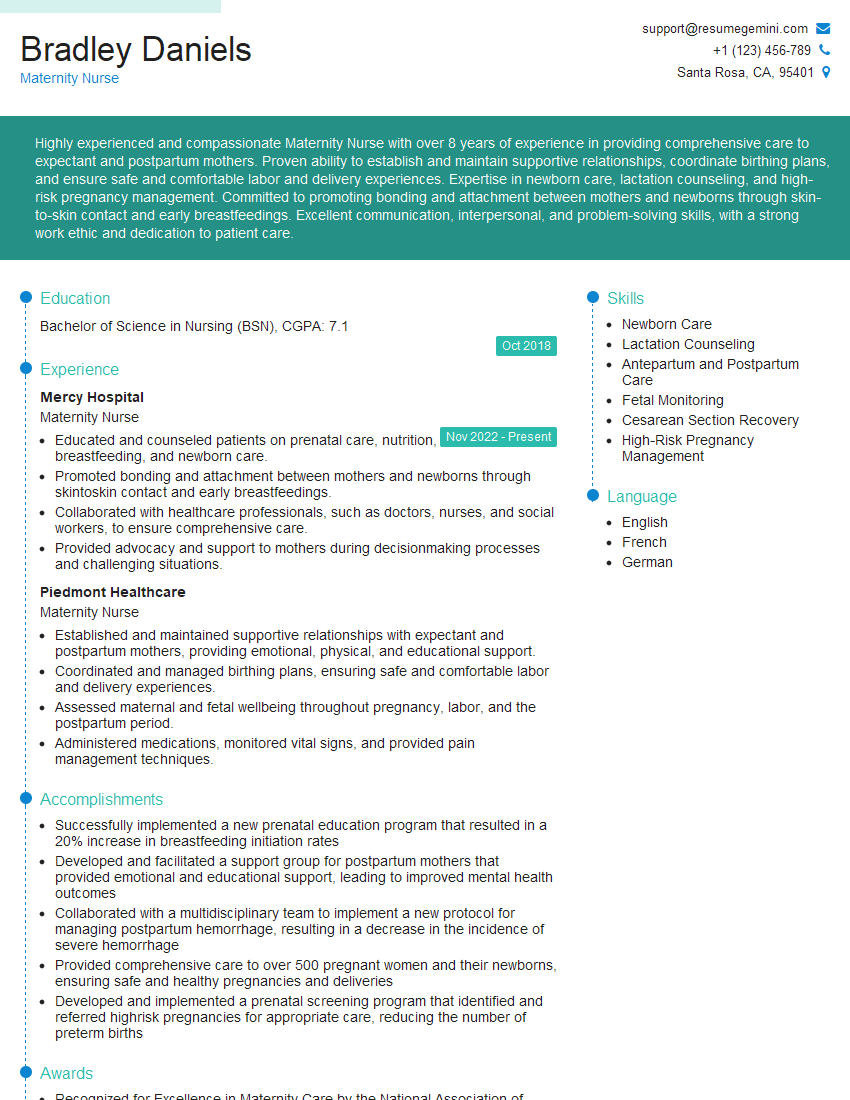Are you a seasoned Maternity Nurse seeking a new career path? Discover our professionally built Maternity Nurse Resume Template. This time-saving tool provides a solid foundation for your job search. Simply click “Edit Resume” to customize it with your unique experiences and achievements. Customize fonts and colors to match your personal style and increase your chances of landing your dream job. Explore more Resume Templates for additional options.

Bradley Daniels
Maternity Nurse
Summary
Highly experienced and compassionate Maternity Nurse with over 8 years of experience in providing comprehensive care to expectant and postpartum mothers. Proven ability to establish and maintain supportive relationships, coordinate birthing plans, and ensure safe and comfortable labor and delivery experiences. Expertise in newborn care, lactation counseling, and high-risk pregnancy management. Committed to promoting bonding and attachment between mothers and newborns through skin-to-skin contact and early breastfeedings. Excellent communication, interpersonal, and problem-solving skills, with a strong work ethic and dedication to patient care.
Education
Bachelor of Science in Nursing (BSN)
October 2018
Skills
- Newborn Care
- Lactation Counseling
- Antepartum and Postpartum Care
- Fetal Monitoring
- Cesarean Section Recovery
- High-Risk Pregnancy Management
Work Experience
Maternity Nurse
- Educated and counseled patients on prenatal care, nutrition, breastfeeding, and newborn care.
- Promoted bonding and attachment between mothers and newborns through skintoskin contact and early breastfeedings.
- Collaborated with healthcare professionals, such as doctors, nurses, and social workers, to ensure comprehensive care.
- Provided advocacy and support to mothers during decisionmaking processes and challenging situations.
Maternity Nurse
- Established and maintained supportive relationships with expectant and postpartum mothers, providing emotional, physical, and educational support.
- Coordinated and managed birthing plans, ensuring safe and comfortable labor and delivery experiences.
- Assessed maternal and fetal wellbeing throughout pregnancy, labor, and the postpartum period.
- Administered medications, monitored vital signs, and provided pain management techniques.
Accomplishments
- Successfully implemented a new prenatal education program that resulted in a 20% increase in breastfeeding initiation rates
- Developed and facilitated a support group for postpartum mothers that provided emotional and educational support, leading to improved mental health outcomes
- Collaborated with a multidisciplinary team to implement a new protocol for managing postpartum hemorrhage, resulting in a decrease in the incidence of severe hemorrhage
- Provided comprehensive care to over 500 pregnant women and their newborns, ensuring safe and healthy pregnancies and deliveries
- Developed and implemented a prenatal screening program that identified and referred highrisk pregnancies for appropriate care, reducing the number of preterm births
Awards
- Recognized for Excellence in Maternity Care by the National Association of Certified Professional Midwives
- Award for Compassionate Care in Maternity from the March of Dimes
- Certified as a HighRisk Pregnancy Specialist by the American College of NurseMidwives
- Recognition for Outstanding Contribution to Maternal and Infant Health by the International Confederation of Midwives
Certificates
- Certified Lactation Counselor (CLC)
- Certified Nurse Midwife (CNM)
- International Board Certified Lactation Consultant (IBCLC)
- Neonatal Resuscitation Program (NRP)
Career Expert Tips:
- Select the ideal resume template to showcase your professional experience effectively.
- Master the art of resume writing to highlight your unique qualifications and achievements.
- Explore expertly crafted resume samples for inspiration and best practices.
- Build your best resume for free this new year with ResumeGemini. Enjoy exclusive discounts on ATS optimized resume templates.
How To Write Resume For Maternity Nurse
- Highlight your experience and expertise in maternity care, particularly in areas such as labor and delivery, newborn care, and postpartum support.
- Showcase your passion for helping mothers and families during this special time by providing specific examples of how you have made a difference in their lives.
- Quantify your accomplishments whenever possible, using specific numbers or metrics to demonstrate the impact of your work.
- Proofread your resume carefully for any errors in grammar or spelling.
Essential Experience Highlights for a Strong Maternity Nurse Resume
- Established and maintained supportive relationships with expectant and postpartum mothers, providing emotional, physical, and educational support.
- Coordinated and managed birthing plans, ensuring safe and comfortable labor and delivery experiences.
- Assessed maternal and fetal wellbeing throughout pregnancy, labor, and the postpartum period.
- Administered medications, monitored vital signs, and provided pain management techniques.
- Educated and counseled patients on prenatal care, nutrition, breastfeeding, and newborn care.
- Promoted bonding and attachment between mothers and newborns through skin-to-skin contact and early breastfeedings.
Frequently Asked Questions (FAQ’s) For Maternity Nurse
What is the role of a Maternity Nurse?
A Maternity Nurse provides comprehensive care to expectant and postpartum mothers, including emotional, physical, and educational support. They coordinate birthing plans, monitor maternal and fetal wellbeing, administer medications, educate patients on prenatal care and newborn care, and promote bonding between mothers and newborns.
What are the qualifications to become a Maternity Nurse?
Maternity Nurses typically hold a Bachelor of Science in Nursing (BSN) degree and have experience in labor and delivery, newborn care, and postpartum care.
What are the key skills required for a Maternity Nurse?
Maternity Nurses require strong clinical skills, including newborn care, lactation counseling, antepartum and postpartum care, fetal monitoring, cesarean section recovery, and high-risk pregnancy management. They also need excellent communication, interpersonal, and problem-solving skills.
What are the career opportunities for Maternity Nurses?
Maternity Nurses can work in hospitals, birthing centers, and private practice settings. They can advance their careers by specializing in areas such as high-risk pregnancy management, lactation consulting, or nurse management.
What is the salary range for Maternity Nurses?
The salary range for Maternity Nurses varies depending on experience, location, and employer. According to Salary.com, the average salary for Maternity Nurses in the United States is around $75,000 per year.